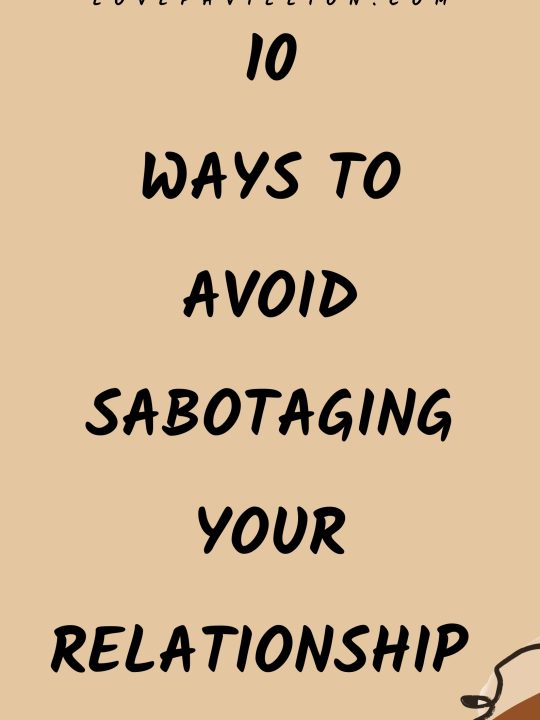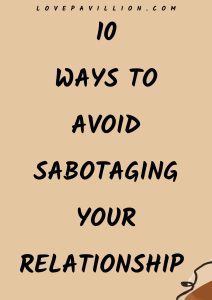Maintaining a healthy, happy and lasting relationship can be challenging at times, but it is worth the effort to keep your relationship strong and fulfilling.
Communication, honesty, support, and forgiveness are all essential elements to prevent sabotaging your relationship.
In this blog post, we will delve into these seven key points and explore how you can incorporate them into your relationship.
7 Ways To Avoid Sabotaging Your Relationship
1. Communicate Openly and Honestly
Communication is the foundation of any successful relationship.
It involves expressing your thoughts, feelings and needs while also listening to your partner’s perspective.
Good communication requires honesty, transparency, and a willingness to be vulnerable.
Here are some tips to improve your communication:
- Be honest:
Honesty is essential in any relationship.
You should always be truthful with your partner, even if it means having difficult conversations.
Honesty builds trust, which is crucial for a healthy relationship.
- Use “I” statements:
“I” statements are an effective way to communicate your feelings without blaming or accusing your partner.
For example, “I feel hurt when you ignore me” is more effective than “You always ignore me.”
- Listen actively:
Listening actively means giving your partner your undivided attention and understanding their perspective.
Avoid interrupting or dismissing their feelings.
- Compromise:
Healthy communication involves compromising and finding a solution that works for both partners.
Be open to hearing your partner’s suggestions and work together to find a resolution.
2. Avoid Playing Games
Playing mind games or manipulating your partner is a toxic behaviour that can sabotage your relationship.
These behaviours create mistrust and can lead to resentment.
Here are some behaviours to avoid:
- Ghosting:
Ghosting is when you suddenly stop communicating with your partner without explanation.
It’s hurtful behaviour that can cause confusion and total breakdown.
- Silent treatment:
The silent treatment is a form of emotional manipulation where you refuse to speak to your partner.
It can cause anxiety and tension in your relationship.
- Ultimatums:
Ultimatums are a threat to your relationship.
They can make your partner feel trapped and create resentment.
3. Be Supportive
What other way can you show how much you’re in a healthy relationship and are right for your partner than being supportive of them?
It shows that you care about their happiness and success.
Here are some ways to be supportive:
- Celebrate successes:
When your partner achieves a goal, celebrate their success with them.
It can be as simple as taking them out for dinner or writing them a congratulatory note.
- Encourage during difficult times:
When your partner is going through a tough time, offer your support and encouragement.
Listen to their concerns and let them know that you’re there for them.
- Respect their decisions:
Your partner may have different goals and dreams than you.
It’s important to respect their decisions and support them, even if you don’t understand their choices.
4. Don’t Hold Grudges
Holding onto grudges or resentment can be damaging to your relationship.
It can lead to a build-up of unresolved issues which in turn can be the end of the relationship.
Holding grudges also builds a wall of distrust among partners as they will always second guess each other’s intentions if that has been the way they relate.
Don’t hold grudges and if you did in the past and need a way out, here are some ways to let go of grudges:
- Communicate your feelings:
If your partner has hurt you, communicate your feelings in a calm and respectful manner.
Explain how their actions made you feel and work together to find a resolution.
- Practice forgiveness:
Forgiveness is essential in any relationship.
It doesn’t mean forgetting the past, but it means letting go of resentment and moving forward.
- Don’t bring up the past:
Avoid bringing up past mistakes or issues during arguments.
It’s important to focus on the present and find a solution that works for both partners.
5. Manage Expectations
Managing expectations is what everyone should practise in any healthy relationship.
Unrealistic expectations can lead to disappointment and hurt, while realistic expectations can build trust and strengthen your bond.
Here are some ways to manage your expectations:
- Be realistic:
It’s important to have realistic expectations of your partner and your relationship.
Recognize that no one is perfect and that relationships have their ups and downs.
- Communicate expectations:
Communicate your expectations with your partner.
Be clear and concise about what you need from your partner and your relationship.
- Be flexible:
Be open to changing your expectations if necessary.
Recognize that circumstances can change and that your expectations may need to be adjusted accordingly.
6. Practice Self-Care
Self-care is very important in maintaining a healthy relationship if you don’t want it to take its toll on you.
Taking care of yourself physically, emotionally, and mentally can help you be a better partner and prevent burnout.
Practising self-care can come in the following ways:
- Prioritize self-care:
Make self-care a priority in your life.
Set aside time each day to do something that nourishes your mind, body, or soul.
- Get enough sleep:
Sleep is essential for your physical and mental health.
Aim to get at least 7-8 hours of sleep each night.
- Exercise:
Regular exercise can improve your mood, reduce stress, and boost your overall health.
- Practice mindfulness:
Mindfulness involves being present at the moment and accepting your thoughts and feelings without judgment.
It can help reduce stress and improve your overall well-being.
7. Maintain Independence
Maintaining independence in any relationship while still leaning into your partner is a superpower not many possess.
It involves having your own hobbies, interests, and goals outside of your relationship.
It will give you clarity and not choke up your partner on your constant needs and validation.
Here are some ways to maintain your independence:
- Pursue your passions:
Pursue your passions and interests, even if they don’t align with your partner’s interests.
Having your own hobbies can help you maintain your sense of self and prevent codependency.
- Set boundaries:
Setting boundaries is essential for maintaining independence in your relationship.
Communicate your boundaries with your partner and be clear about what you need to maintain your independence.
- Spend time with friends and family:
Spending time with friends and family outside of your relationship can help you maintain your independence and strengthen your social support network.
In conclusion, maintaining a healthy and happy relationship takes effort and commitment from both partners.
By incorporating these practices into your relationship, you can build a strong, lasting bond with your partner and avoid sabotaging your relationship on the long run.
If you liked this post, you might check these out:









